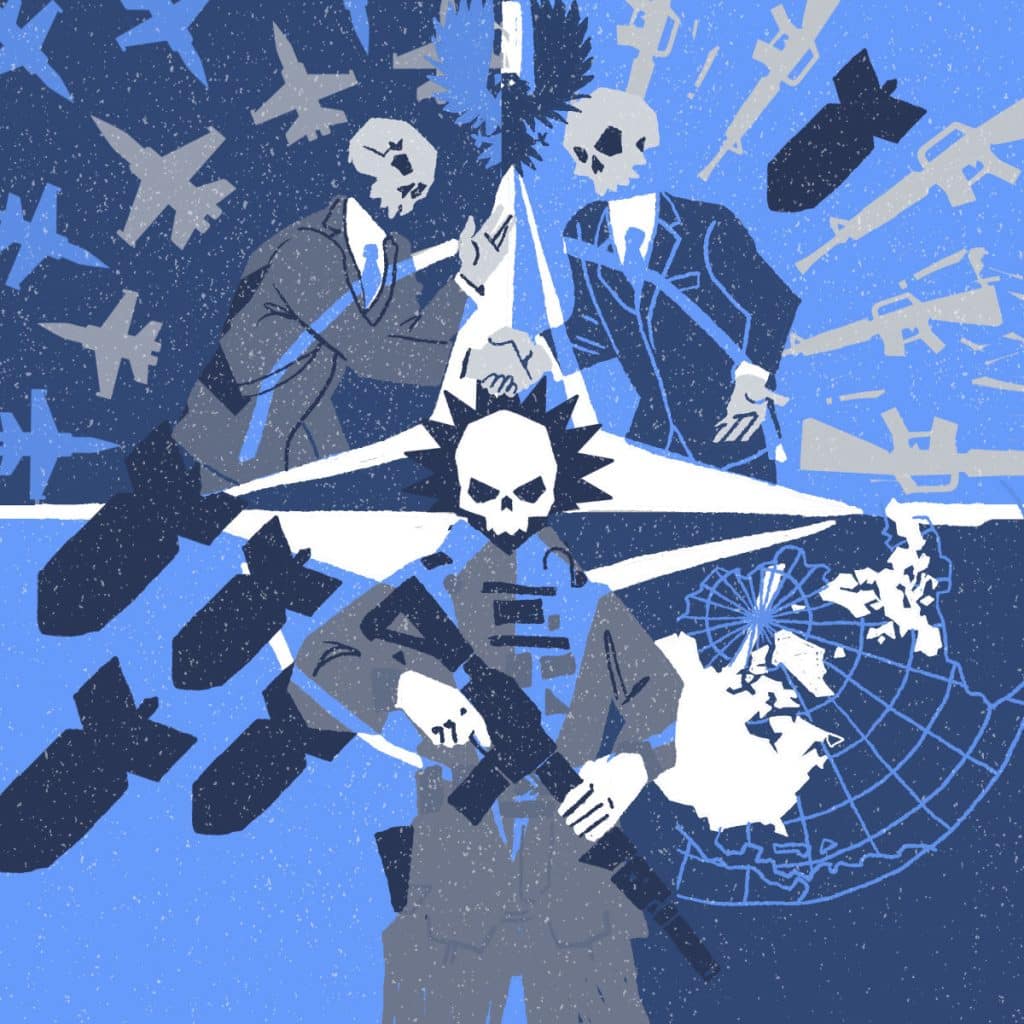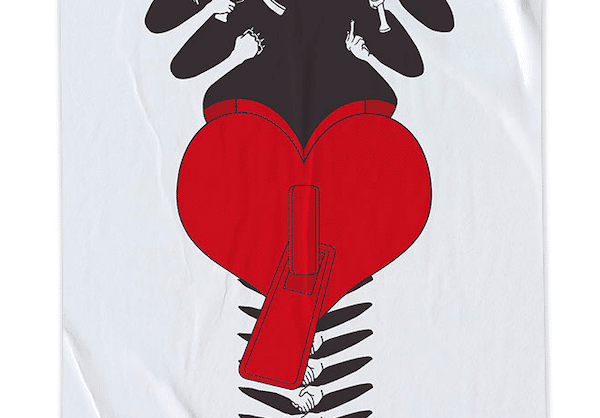Dear friends,
Greetings from the desk of Tricontinental: Institute for Social Research.

Goyen Chen, Know Love, Know Peace. No Love, No Peace, 2022.
On 24 and 25 June, the members of the North Atlantic Treaty Organisation (NATO) will strut around the streets of The Hague for their annual summit—the first since Donald Trump’s return to the U.S. presidency and the first under new NATO Secretary General Mark Rutte. On 13 March, Rutte visited Trump in the Oval Office, where he praised the U.S. president on a number of fronts, including the war in Ukraine. Rutte ended the meeting by telling Trump that he was looking forward to hosting him in The Hague, his ‘hometown’, and was eager to ‘work together to ensure that [the NATO summit] will be a splash, a real success projecting American power on the world stage’.
There are thirty-two full members of NATO, thirty from Europe and two from North America. The United States is only one among them, yet, as Rutte made clear in his statement, it is the one that defines NATO and is but a vehicle for the projection of U.S. power. There should be no doubt about that fact. It is precisely for this reason that the idea of the U.S. leaving NATO—as Trump threatened to do if the Europeans did not increase their military spending—is moot. NATO is the United States.

Tricontinental: Institute for Social Research, Untitled, 2025.
From Tricontinental: Institute for Social Research, the No Cold War collective, and our European partners at the Zetkin Forum for Social Research comes our June dossier, NATO: The Most Dangerous Organisation on Earth. The title is bold but not hyperbolic. It reflects the facts before us. Since the fall of the Soviet Union, NATO has conducted some of the most lethal wars on the planet and now threatens us with the unthinkable possibility of nuclear conflict. The dossier provides ample evidence of this. Here, we simply note two of the alliance’s more egregious acts over the past decades:
- It was NATO that dismembered Yugoslavia in 1999.
- It was NATO that destroyed the Libyan state in 2011.
It is erroneous to see NATO as an autonomous actor. NATO, as Rutte so eloquently stated, is an instrument of ‘projecting American power on the world stage’. Since the end of the Cold War, the United States has used NATO to incorporate Eastern Europe into a pliable set of states subordinate to its interests. When the European Union expanded eastward and sought to build autonomous European institutions, NATO came along and ensured that the United States would be the engine of any European expansion. One might be forgiven for having forgotten the warning that came not from Russia’s current President Vladimir Putin but from his decidedly pro-US predecessor Boris Yeltsin, who warned during NATO’s 1995 bombing of the Bosnian Serbs, ‘this is the first sign of what could happen when NATO comes right up to the Russian Federation’s borders. … The game of war could burst out across the whole of Europe’. In 1990, the Soviet Union reluctantly agreed to the reunification of Germany and its entry into NATO under assurances that the alliance would not expand eastward (the U.S. also used the move to ‘keep the Germans down’ by keeping them anchored within NATO structures). But there was no agreement that the U.S. could use NATO as an instrument to project power right up to Russia’s borders. Nor was there any mandate for NATO to be used in far-off theatres like the South China Sea to confront the People’s Republic of China under the pretext of freedom of navigation and regional stability. NATO—against the self-interest of its European member states—has been drawn into confrontations against Russia and China that are entirely about the U.S. wanting to shackle its ‘near-peer rivals’. These confrontations have nothing to do with European security: neither Russia nor China have threatened Europe, with Russia repeatedly reiterating that its war in Ukraine has everything to do with threats on its borders and China emphasising that it is a defensive power with no aggressive intentions regarding Europe.

Goyen Chen, War Only Brings Pain, 2022.
Before Donald Trump took office in December 2024, his transition team told European officials that the president-elect would ask NATO member states to increase their military spending to 5% of their Gross Domestic Product (GDP), compared to the previous target of 2%. Most states would not be able to comply with this dramatic increase without deep cuts to their social expenditure (as of late 2024, Poland is the only member state that spends more than 4% of its GDP on its military—4.12% to be exact—while the United States officially spends 3.38%). U.S. Ambassador to NATO Matthew Whitaker said that while this 5% demand would not come with a deadline, ‘the United States expects every ally to step up with concrete plans, budgets, timelines, [and] deliverables to meet the 5% target and close capability gaps’.
From NATO’s founding in 1949—and even throughout the Cold War—there was no firm benchmark for military spending for member states (such as percentage of GDP). The 1952 Lisbon Agreement on NATO force levels, which set targets for the number of conventional and reserve forces, simply could not be met due to the privations in post-war Europe. In the 1970s, NATO members had to fill out a Defence Planning Questionnaire to assess national military spending efforts, but no targets could be set. During Ronald Reagan’s presidency (1981—1989)—when the U.S. was spending around 6% of GDP on defence—questions were again raised about force level goals and defence spending, and there were calls for European members states to increase their share to as much as 4% of GDP. In the early 1990s, with the collapse of the Soviet Union, Washington feared that NATO states would cut their military budgets. At the 2002 NATO Summit in Prague, alliance leaders adopted the Prague Capabilities Commitment, which once more called for the need to modernise forces in the context of the War on Terror, but no formal spending target was established.
It was not until the 2006 Riga Summit, when NATO officially endorsed the 2% target, that the first formal benchmark for military spending among member states emerged. Though pressure mounted at the 2014 Wales Summit to comply with this hitherto unmet goal, there was still no real enthusiasm for it. Trump pushed hard during his first term, suggesting that the U.S. would leave NATO if the Europeans did not increase their military spending. Then, when Russia invaded Ukraine in 2022, the 2% goal began to be seen—as then NATO Secretary General Jens Stoltenberg said—‘not as a ceiling, but the minimum, a floor’. In anticipation of this year’s summit in The Hague, current NATO Secretary General Mark Rutte said that NATO members must ‘shift to a wartime mindset and turbo charge our defence production and defence spending’.

Othman Ghalmi, Where Can I Find Peace, 2022.
Various European institutes and movement platforms have already begun to release documents in anticipation of the upcoming NATO summit. One is the annual report from the German Institutes of Peace and Conflict Research (Bonn International Centre for Conflict Studies, Institut für Friedensforschung und Sicherheitspolitik, Institut für Entwicklung und Frieden, and the Leibniz Institut für Friedens-und Konfliktforschung), which argues that Europe must prepare for a post-US NATO by increasing its own military spending and moving toward non-lethal forms of diplomacy such as arms control and peace-building measures. This is one approach to the NATO crisis, but it suffers from two key flaws: first, it misunderstands Europe’s role in NATO by treating it as an equal partner, when NATO is in fact an instrument for the subordination of Europe to U.S. strategic aims, and second, even if member states in Europe increase their military spending to 5% of GDP, they simply do not have the capacity to do so.
The British government’s Strategic Defence Review 2025 is basically a recipe for bankruptcy. Britain simply does not have the resources to build a new ‘hybrid navy’ with ‘hybrid airwings’, provide housing for the working class, or refurbish its health care system. It is easy to write about a ‘whole-of-society’ approach but hard to find the money to build a society strained by so many afflictions. On the other hand, the National Union of Rail, Maritime, and Transport Workers and the Campaign for Nuclear Disarmament make a perfectly reasonable case for ‘human security and common security’, as they write it in their Alternative Defence Review. They argue this can be achieved by:
- Prioritising diplomacy, global cooperation, and conflict prevention.
- Investing in health, education, climate resilience, social care, and the creation of well-paid, secure, unionised, and socially useful jobs.
- Significantly reducing military spending.
- Immediately halting arms exports to countries involved in active conflict or human rights abuses (including Israel and the Gulf States).
- Preparing and executing a just transition for defence-dependent workers and communities.
These are sensible, achievable goals in a world where most peoples want peace and progress, not war and waste.
Warmly,
Vijay

